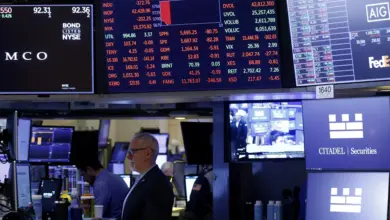The economies of Egypt, Yemen, Tunisia and Syria are likely to fall into recession in 2011 as economic activity falls sharply following popular uprisings since January, a global bank group forecast on Tuesday.
Growth forecasts for the Arab world by the Institute of International Finance (IIF) show Yemen's economy will contract the most, contracting by 4 percent, while the economies of Syria will shrink by 3 percent, Egypt by 2.5 percent and Tunisia by 1.5 percent in 2011.
The economies of Arab oil importers are set to shrink by only 0.5 percent this year compared with growth of 4.4 percent last year, the IIF said. It forecast growth will rebound by 4.2 percent in 2012 assuming countries are able to restore political stability.
In comparison, the International Monetary Fund last month forecast that growth for the group of oil importers will be 1.9 percent this year, rising to 4.5 percent in 2012.
The IIF is a Washington-based global bank group representing more than 430 banks and financial institutions worldwide.
Meanwhile, the IIF said growth of Arab oil-exporting countries, which have mostly avoided mass popular protests, is set to rise sharply, jumping 11 percent in 2011 and 11.5 percent next year, up from just 0.9 percent in 2010.
Qatar will by far see the fastest growth at 19 percent this year followed by Iraq with 11.9 percent growth, the IIF forecast. It projected growth of 5.3 percent in Saudi Arabia this year.
The combined external current account surpluses of Gulf Arab states Bahrain, Saudi Arabia, United Arab Emirates, Kuwait, Oman and Qatar are set to more than double this year to around $292 billion from $128 billion, thanks to sharply higher global oil prices, the IIF said.
It forecast the average price of oil will be $115 a barrel in 2011 compared to $80 per barrel last year. Brent crude for June fell to $123.79 a barrel on Tuesday, off its 2011 peak of $127.02 on April 11.
George Abed, IIF senior counselor and a former IMF official, told reporters he expects Saudi Arabia and other GCC states to come to the aid of Tunisia and Egypt as they deal with the aftermath of the protests that toppled their respective rulers.
"The GCC will be providing money soon and I think it will be unconditional, it will consist of some grants and some long-term loans," he said, adding: "The Saudis like to make a deposit in the central bank."
Abed, who said he had traveled to the region recently, said the World Bank was expected to approve lending worth $2.2. billion for Egypt, in addition to bilateral funding from donors such as the United States and European Union.
The International Monetary Fund is currently in talks with Egypt on a possible loan program that will include a package of economic reform measures that will stabilize their economies and bring about private-sector led growth.
The World Bank and African Development Bank have committed a total of $1 billion in funding for Tunisia.




